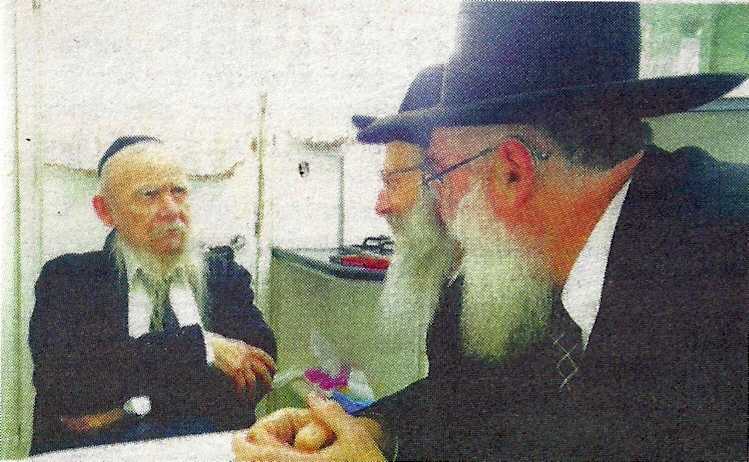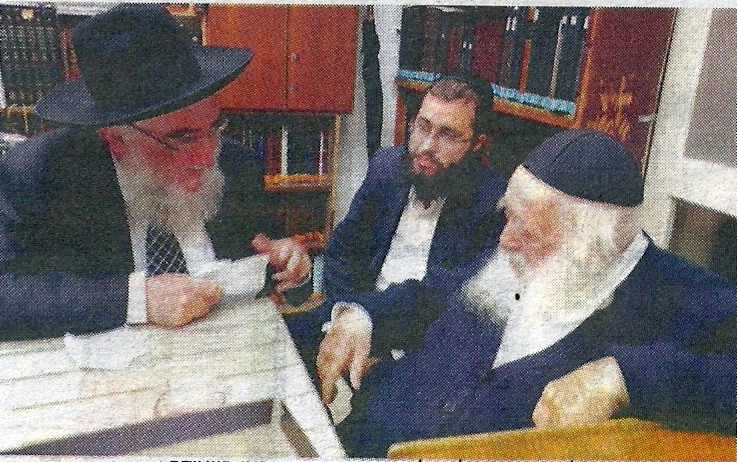The 13th Annual Chinuch Gathering is being held these days at a hotel in Eretz Yisroel. Prominent rabbonim and roshei yeshiva spoke at the event, stressing its importance to strengthen the performance of the chinuch institutions.
In connection with the meeting, a number of questions were posed to Maran Rosh Hayeshiva HaRav Gershon Edelstein shlita and to Maran Sar HaTorah HaRav Chaim Kanievsky shlita. The questions and the answers given were presented at the gathering, and are reproduced here for the benefit of our readers.
Asking HaRav Edelstein the questions on chinuch

Questions and Answers: HaRav Gershon Edelstein
Q. Is it permissible to tell a child a fabricated story in order to strengthen him in Torah and mitzvos?
A. "Yes, but it should be a plausible story that could have happened."
Q. Should melamdim avoid oral tests which highlight the abilities of the better students but are liable to discourage or even break the weaker ones?
A. One should make the exam very easy. The purpose of the examinations is to encourage the children.
Q. What are the circumstances which allow a teacher to embarrass a student in public?
A. It is altogether forbidden.
Q. If a teacher reprimanded a student unjustifiably, should he apologize in front of the class or refrain for fear that his stature be lessened?
A. It is sufficient to do so to the student alone. Let him admit, "I made a mistake." Why not? This is excellent chinuch, chinuch for good character traits.
Q. Should a teacher invest time and attention to a student who has begun going downhill - if it will be at the expense of the rest of the class?
A. Why should the class suffer? He should try to do both.
Q. Is it advisable to send a mediocre student to a yeshiva for excellent boys so as to challenge him?
A. He is bound to suffer from it.
Q. What message would the Rosh Yeshiva wish to convey to the hundreds of mechanchim gathered at this conference?
A. They should fortify the students in the prohibition of loshon hora, in the mitzvah of honoring parents, of the obligations bein odom lechavero, and not to take affront or bear grudges.
* * *
Asking HaRav Kanievsky the questions on chinuch

Questions and Answers: HaRav Chaim Kanievsky:
Q. If there are two brothers who are close in age but their intellectual capacities are very different - is it advisable that they attend the same cheder and yeshiva or not?
A. It is better that they not learn together.
Q. Is it permissible to pass in front of a kotton who is praying? If it is forbidden, what is the din of a teacher who has to pass for educational purposes, perhaps to say something to another child?
A. No. It is forbidden to do so pass in front of a kotton, but if there is a pressing need it is permitted.
Q. From what age should children begin to study [formal] Mussar? What works are recommended for this and how much time should be devoted to this study?
A. "Emunah Uvitachon"; "Reishis Chochmah", at an age when it is apparent that they understand. Fifteen minutes.
Q. Should one ensure that young children not do things which are said to be damaging to memory?
A. Yes. A child must also be careful about this.
Q. When a father wishes to study gemara with his son outside of regular hours and the child tries to evade it or shows no interest, what should the father do?
A. He should pray about this.
Q. When a boy wishes to attend a certain yeshiva but his parents feel that he is not suited to that particular yeshiva, how does this apply to the rule that "one should choose a place that his heart desires"?
A. Kibbud Av should weigh that the boy attend the yeshiva that his father believes is the best for him. (This applies to a young child who is not mature enough yet to know what is the most suitable for himself.)
Q. A child of 10-11 who does not daven with kavonoh, or does not wish to go to shul — should he be forced to do so?
A. No, one should not force him, but one must pray that he will agree to go.
Q. What should a melamed do to a child who refuses to daven in the class?
A. He should daven that he succeed in educating his students but not hit them, chas vesholom.
Q. If a boy studies during recess instead of playing with his friends - should he be left alone or told to go and play?
A. Let him sit and study. The Gaon writes that "a minimum of conversation" which is advised in Pirkei Avos means that one should talk minimally. Here, too, a child needs play, but in small measure. He needs "minimum play."
Q. What should parents do in order to assure that their children grow in yiras Shomayim?
A. They should pray for this in Shemoneh Esrei and vocalize and express their wish in words and not just in thought.




